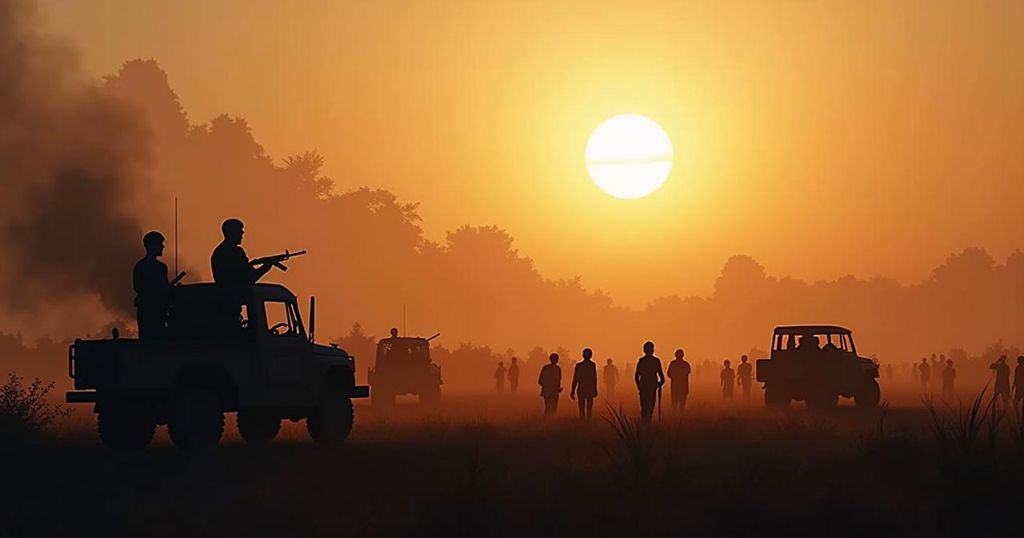Allegations of Military Aggression by Rwanda in Eastern Congo Displaced Persons’ Crisis
Human Rights Watch reports that Rwanda’s army and a supporting militia shelled displaced persons camps in eastern Congo, leading to civilian deaths and humanitarian obstructions. The conflict in eastern Congo involves over 120 armed groups, with accusations of Rwandan military support for the M23 rebel group. Congo has filed a case against Rwanda for violations of sovereignty, and President Tshisekedi has called for sanctions against Rwanda at the U.N. General Assembly.
A recent report by Human Rights Watch has alleged that the Rwandan military, in conjunction with a supporting militia, has engaged in shelling camps for internally displaced individuals in eastern Congo. The report highlights serious human rights violations by both Rwandan and Congolese forces, indicating that both entities have been responsible for civilian deaths, sexual assaults, and have obstructed humanitarian assistance to those in need. Eastern Congo has been embroiled in ongoing conflict, with over 120 armed groups competing for control of territory and valuable resources, further exacerbated by the presence of the M23 rebel group, which comprises largely ethnic Tutsis. This group, having split from the Congolese army, gained notoriety for its violent uprisings, notably capturing the city of Goma in 2012 and threatening it once again. The government of Congo has accused Rwanda of engaging in hostilities and war crimes in the region, with credible claims from United Nations and U.S. experts suggesting that Rwanda is providing military support to M23. Although Rwanda has denied these allegations, officials did acknowledge, as of February, the presence of their forces in eastern Congo, citing concerns over a significant buildup of Congolese military forces along the border. Recent estimates by U.N. experts suggest that between 3,000 and 4,000 Rwandan troops are currently present in eastern Congo, collaborating with the M23 insurgents, who have reportedly made significant territorial gains. This ongoing conflict has led to a severe humanitarian crisis, displacing approximately six million individuals in the eastern region. In light of these events, a regional court in East Africa has commenced legal proceedings initiated by Congo against Rwanda, accusing the latter of breaching the sovereignty and territorial integrity of Congo. Furthermore, in a recent address to the United Nations General Assembly, President Felix Tshisekedi of Congo called for the imposition of sanctions on Rwanda for its alleged endorsement of the M23 militia.
The situation in eastern Congo is characterized by a complex web of armed conflicts involving a multitude of armed groups, some of which have been responsible for severe human rights abuses such as mass killings and sexual violence. The conflict has persisted for over a decade, largely driven by competition for valuable mineral resources and territory. The March 23 Movement (M23) emerged from a split in the Congolese army and has been implicated in various offenses against civilians, leading to a humanitarian emergency that has resulted in millions of displaced persons. Prior accusations against Rwanda include providing military support to M23, a claim that Rwanda has consistently denied despite acknowledging the presence of its troops in the area. The backdrop of this turmoil is intertwined with regional tensions and allegations of foreign military involvement, which continue to undermine peace and stability in the region.
In conclusion, the allegations of military aggression by Rwanda and the humanitarian crisis afflicting millions in eastern Congo underline the severity of the ongoing conflict in the region. Reports from Human Rights Watch highlight the dire circumstances faced by displaced individuals and the persistent human rights abuses perpetrated by both state and non-state actors. The international community’s response, including legal actions against Rwanda and calls for sanctions, will be critical in addressing these grievances and promoting accountability in the East African region.
Original Source: www.washingtonpost.com




Post Comment